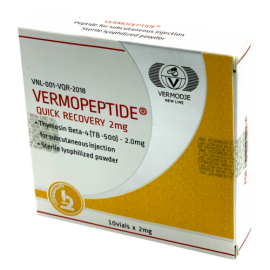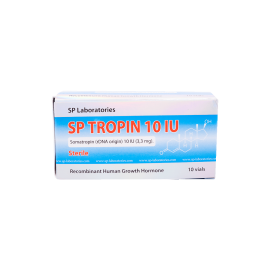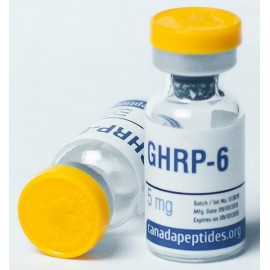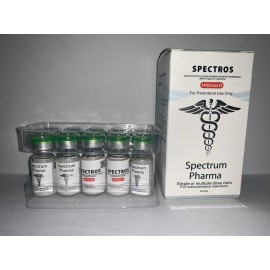$0.00
Description
If you are actively involved in sports, then you have probably encountered injuries that did not allow you to progress and build the desired muscle tissue and strength indicators. There is a solution, Vermopeptide Thymosin Beta-4 from Vermodje allows you to quickly restore not only damage to the joints and ligaments, but even damage to the myocardium.
Thymosin beta-4 (Tβ4) is a naturally occurring regenerative peptide found in all tissues and all cell types except red blood cells. It is also found in the blood and other body fluids, including tears, saliva, cerebrospinal fluid, and even ichorus. Although Tβ4 contains only 43 amino acids, it appears to have a wide range of regenerative activities and specific regions of the molecule that have been shown to mediate these effects. Both chemically synthesized and recombinant forms have proven effective in healing skin and other tissues. Tβ4 also exhibits restorative and regenerative activity in a number of other injury models such as traumatic brain injury, spinal cord injury, stroke, multiple sclerosis model, ischemic limbs, and ischemic heart injury, joint and ligament injury. The processes and pathways of Tβ4-mediated repair are similar in these different tissues and contribute to the observed skin healing process.
Mechanism of action
Tβ4 promotes cell migration and wound healing, has anti-inflammatory properties, and inhibits apoptosis. Tβ4 affects T cell differentiation. It has no signal sequence, but is found in the blood serum.Tβ4 does not bind to either heparin or other extracellular matrix molecules, which suggests its rapid penetration through various types of tissues to injury sites. Tβ4 levels are highest in platelets and polymorphonuclear neutrophilic leukocytes (PMNs), which are among the first cells formed, respectively, to enter the wound and release their factors, some of which recruit additional cells to the wound site. High levels of Tβ4 in human ichorus (13 mg/ml) indicate its importance in wound healing. Tβ4 promotes migration, survival, and recovery of cardiomyocytes (heart cells) after experimental myocardial infarction, suggesting its potential as a new therapeutic target in the setting of acute heart cell injury.
Thus, the purchase of Vermopeptide Thymosin Beta-4 will improve the condition of internal organs.
In addition to its effect on wound healing, the anti-inflammatory properties of Tβ4 are quite pronounced. It is reported that Tβ4 inhibited PMN chemotaxis of the bacterial chemoattractant PMN. An interesting question is whether Tβ4 has a direct or indirect effect on PMN. Other studies have shown that activation-reactive expression of a lymphospecific form of Tβ4 may be one of the mechanisms by which dendritic epidermal T cells and possibly other intraepithelial lymphocytes reduce inflammation. In a separate study, Tβ4 reduced circulating levels of inflammatory cytokines and intermediates after LPS administration in vivo.In addition, Tβ4 levels rapidly disappeared in the blood after LPS administration or during septic shock, suggesting that it may be involved in the early events leading to the activation of the inflammatory cascade and ultimately the clinical consequences of sepsis.
The two main epithelial cell responses to injury are cell migration to cover the base of the wound and cell proliferation to re-epithelialize the wound. Tβ4 significantly enhances the migration of endothelial cells, keratinocytes, tumor cells and corneal epithelial cells. It is hypothesized that Tβ4 may promote migration through its regulation of the expression of an actin cytoskeleton regulating protein. Tβ4 promoted skin wound repair in animal models. These data suggest that Tβ4 may be beneficial in the healing of any injury or injury.
Evidence that Tβ4 functions as an anti-apoptotic (prevents programmed cell death) agent is only growing. HeLa cells overexpressing Tβ 4 showed higher growth rates and a lower percentage of basal apoptosis compared to control group HeLa cells. In addition, overexpressed cells were more resistant to death. The death of human corneal epithelial cells (HCET), provoked by the introduction of FasL or hydrogen peroxide, was stopped by the introduction of Tβ4. This means that TB-500 not only suppresses inflammation, but also prevents cell destruction.
Growing evidence for the use of Tβ-4 as a new wound healing and anti-inflammatory agent opens up new possibilities for the treatment of sports wounds and injuries, helping athletes regain their former functionality and protect against new injuries.
Properties
- accelerates the regeneration of injuries of the joints and ligaments,
- restores other damage to internal organs, including the heart, nerves, endocrine glands, etc.
- reduces inflammation
- prevents programmed cell death,
- accelerates the recovery of muscle tissue after physical overload,
Well
TB-500 injections are performed with an insulin syringe into the fold of the abdominal skin near the navel (or into the area of injury). Injections can be given on two schedules, either 500 mcg per day, or on a schedule with a loading of 2 mg every other day (8 mg per week) during the week, the next week of 6 mg during the week is divided into two injections (for example, Monday and Thursday ) and then 500 mcg every other day until the injury regenerates.
Combined course
TB-500 according to the proposed scheme and Ibutamoren 2 capsules at bedtime, where 3 days of taking Ibutamoren alternate with 3 days of rest.
Optimal combined course
TB-500 according to the proposed scheme, growth hormone 5 IU per day.





